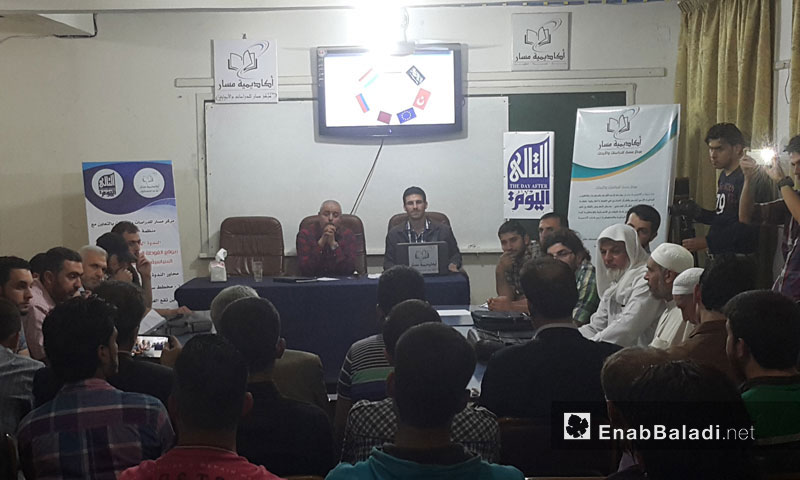A small room may not be enough to accommodate the discussion of a complex term like “the useful Syria,” which has entered the Syrian issue through its widest doors recently, and fed wide-ranging debate, both intellectual and military — but still, this room embraced a forum unique in its type in the eatern Ghouta, with its organizers trying to exchange viewpoints and determine the place of their district within this phrase.
“The position of the eastern Ghouta in the political equation in Syria,” was the name given to the discussion of dozens of intellectuals, in which various social classes participated from all the towns and cities of the Ghouta on Tuesday, October 11, in the Masar center for studies and research in the city of Saqba, in cooperation with The Day After organization. An hour and a half of discussion was not enough to present all the viewpoints, according to some of the attendees who spoke to Enab Baladi.
The forum included a number of angles, including “the ‘useful Syria’ plan,” and the position of the eastern Ghouta in the circle of the state’s interests, which Thaer Hijazi, a communications officer in The Day After described to Enab Baladi as “political activity for a term we have been hearing about in the media for some time.”
About 65 people participated in the forum, including young intellectuals and politically-conscious people in the Ghouta. It was attended by sheikhs, professors, doctors, engineers and students, according to Hijazi, who said it opened the door of continuous discussion for these sorts of issues in the Ghouta, “after the absence of the Baath regime. No one was able to express their political color five years ago.”
The forum administration received a political science professor in the Ghouta, Hamed Eissa, and most of the attendees expressed their views regarding the Ghouta’s political situation, including the agricultural engineer and activists Salem al-Kirish, who said the forum was a unique gesture in light of the siege, as it, “raised genuine topics everyone is interested in — that is, the definition of ‘useful Syria’.”
“The forum showed that cultural consciousness has reached a high level among youth here,” according to Kirish, who said that it was a “positive cultural dialogue” and urged that, “we not be more excited by headlines as much as we are active in any cultural issue.”
The agricultural engineer called for work on the Ghouta’s fighters through the Masar center to “reach a documented study of the mechanisms to activate them as a collective force, in order to change the political and military equation,” adding that, “the cultural forums are a part of all this discourse.”
Osama Nassar, deputy editor of the “Rising for Freedom” magazine, attended the forum, and said that it “included reasonable discussion, enabling every participant to discuss what was occupying him,” but everyone felt the need for more time, he said.
Nassar said that raising these types of issues may not be on the basis of question and answer, describing the discussion of the term “useful Syria” as a “disturbing issue, even if it is realistic now.”
“Useful Syria” is a term used by the Syrian regime President Bashar al-Assad in one of his speeches in September 2015. Most analysts believe that it means the division of Syria into sectarian statelets, which various parties can benefit from, most prominently Iran, which opposition members say is working on a broad sectarian project in the Middle East, with Syria at its center, by using thousands of fighters and advisers working alongside the Assad regime.
This article was translated and edited by The Syrian Observer. Responsibility for the information and views set out in this article lies entirely with the author.
